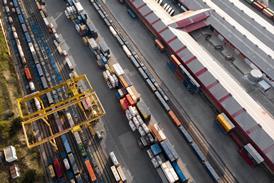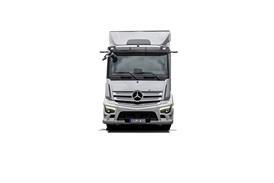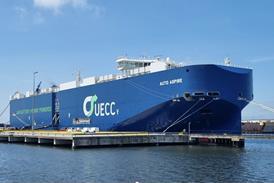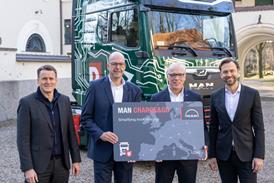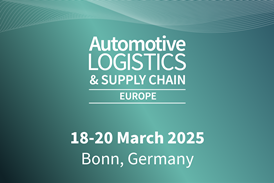Inbound Logistics – Page 51
-
 Feature
FeatureThe long way home
For inbound automotive supply chains, returnable packaging just makes sense. No carmaker wants to spend money on wood, paper and cardboard again and again, only to have to fork out straight away for costly waste disposal.
-
 Feature
FeatureThe quest for greater unity
One of the main priorities for inbound supply chain managers from a packaging perspective is the proper management of returnable containers and packages so they are delivered as quickly, efficiently and economically as possible. To achieve this, many North American OEMs have up to now insisted on their own forms ...
-
 Feature
FeatureQ&A: Iain Lindsay
What do you say to potential investors who are concerned about what Brexit may mean for trade, particularly with the flow of goods and material being so essential to the automotive industry?Brexit is an issue that is at the heart of business concerns: what will it mean in terms of ...
-
 Feature
FeatureGerman automotive body warns on US trade tensions
German sector association the VDA has warned that ongoing trade tensions between the US and Europe and, separately, the US and China should not be allowed to derail the mutually beneficial relationship its OEMs currently have with the North American country. The warning coincides with news that VW and Ford ...
-
 Feature
FeatureMexican car industry calls for action on fuel shortage
Mexico’s new federal government has launched a radical strategy to combat the country's long-term problem of fuel theft. However, this has led to fuel shortages in central regions, which have closed gas stations, and is now threatening the transport and logistics supporting the automotive sector.States including Hidalgo, Jalisco, Michoacan, Guanajuato ...
-
 Feature
FeaturePacking a punch
Electric cars could revolutionise transport by providing a cheaper, safer and more environmentally friendly way to travel. The International Energy Agency forecasts that there will be 13m electric vehicles (EVs) on the road globally by 2020, while PwC Autofacts predicts that 55% of all new vehicle sales will be fully ...
-
 Feature
FeatureBMW Regensburg named as ‘manufacturing lighthouse’
The World Economic Forum (WEF) has named BMW’s Regensburg car assembly plant as a “manufacturing lighthouse” of the so-called fourth industrial revolution, thanks to the factory’s innovations in logistics.The plant, in south-eastern Germany, is one of just seven worldwide awarded the honour this year for successful implementation of industry 4.0 ...
-
 Feature
FeatureHonda to halt UK production during Brexit
Japanese OEM Honda is to suspend production at its British plant for six days in April after the UK leaves the European Union on March 29.The decision follows an assessment of how best to prepare for any logistics and border problems following Brexit.“These contingency provisions have been put in place ...
-
 Feature
FeatureInnovation and smart tech: Why BMW is driving both
Handling 31m parts and producing almost 10,000 vehicles each day, BMW is increasingly looking to digitalisation and Industry 4.0 innovations to help it organise its logistics more flexibly…
-
 Feature
FeatureQ&A: Neuton Karassawa
Can you give an overview of GM’s logistics activities in Brazil, and your own responsibilities?The scope of my function in the region is to handle the inbound pieces and materials, such as local inbound flows from overseas to South America. I [also] manage outbound flows from the factories to customers ...
-
 Feature
FeatureStepping up the pace
When Groupe PSA bought Opel/Vauxhall from GM in 2017 for €2.2 billion ($2.33 billion), Gefco was already providing logistics services for it. Then, when Opel/Vauxhall renewed its contract for fourth-party logistics (4PL) services with Gefco in October 2018 for a further four years, Gefco was tasked with finding further cost ...
-
 Feature
FeatureBrazil needs investment and talent to flip the recession
While the automotive sector in Brazil waits for political reform under its new president-elect Jair Bolsonaro, including investment in transport and infrastructure, logistics providers need to be creative in overcoming the existing poor state of the roads and ports. That is if the country is to exploit returning growth, including ...
-
 Feature
FeatureBritish automotive industry finds new markets
Asia was the fastest growing foreign market for the UK’s automotive sector last year, with the value of exported goods up 21% on 2016, a new survey has shown.The Asian increase helped lift the sector’s total exports to £40 billion ($51.5 billion) – a 26% increase in two years – ...
-
 Feature
FeatureGefco signs up for new inbound and outbound services
Components supplier Plastic Omnium has signed a contract with Gefco for the management of inbound plastic components through the logistics provider’s Halewood facility in the UK and onto its plant in Warrington. Gefco has also announced partnerships with Actility and Wakeo to more accurately track the cradles used to deliver ...
-
 Feature
FeatureToyota Australia opens its largest parts warehouse
The largest parts warehouse run by Toyota Australia has been officially opened at Kemps Creek, New South Wales. It is located on 6.4 hectares close to a network of motorways and major arterial roads in the Western Sydney conurbation.The new Toyota Parts Centre (TPC) will house more than 128,000 parts ...
-
 Feature
FeatureShifting gear
Brazilian vehicle sales have been gathering pace recently, as the country tentatively recovers from its long recession. Light vehicle sales have shown some growth, while bus and truck sales have positively motored ahead. Vehicle sales this year, however, have been tarnished somewhat by stalling exports – especially to Argentina, which ...
-
 Feature
FeatureCompeting on a global stage – report from AL Central and Eastern Europe summit
Over the last 15 years, the centre of investment in the European automotive industry has been shifting east. Delegates at the Automotive Logistics Central and Eastern Europe (ALCEE) summit in Budapest last week learned that the region now has a strong network of assembly and supplier plants, along with logistics ...
-
 Feature
FeatureAuto tariffs pose biggest threat to US economy, warns OFII
The possibility of Donald Trump placing duties on cars and automotive parts being imported into the US is the largest threat to the country’s economic competitiveness, according to the chief financial officers (CFOs) of international companies taking part in a recent survey.The US Department of Commerce is currently investigating whether ...
-
 Feature
FeatureCostly USMCA rules ‘may prove unworkable’ for supply chains
Complying with the proposed US-Mexico-Canada Agreement (USMCA) that replaces Nafta will be expensive for those in the automotive supply chain and could prove unworkable for some, according to John Bozzella (pictured), president and CEO of the Association of Global Automakers in the US. Details in the draft accord include a ...
-
 Feature
FeatureEconomic nationalism to force a lane-change
Typically, the world experiences waves of economic nationalism every three decades but these are often limited to one region each time. Today we’re experiencing a global wave of economic disruption across multiple regions simultaneously. In reaction, automotive manufacturers are having to increase the flexibility and agility of their supply chains ...









